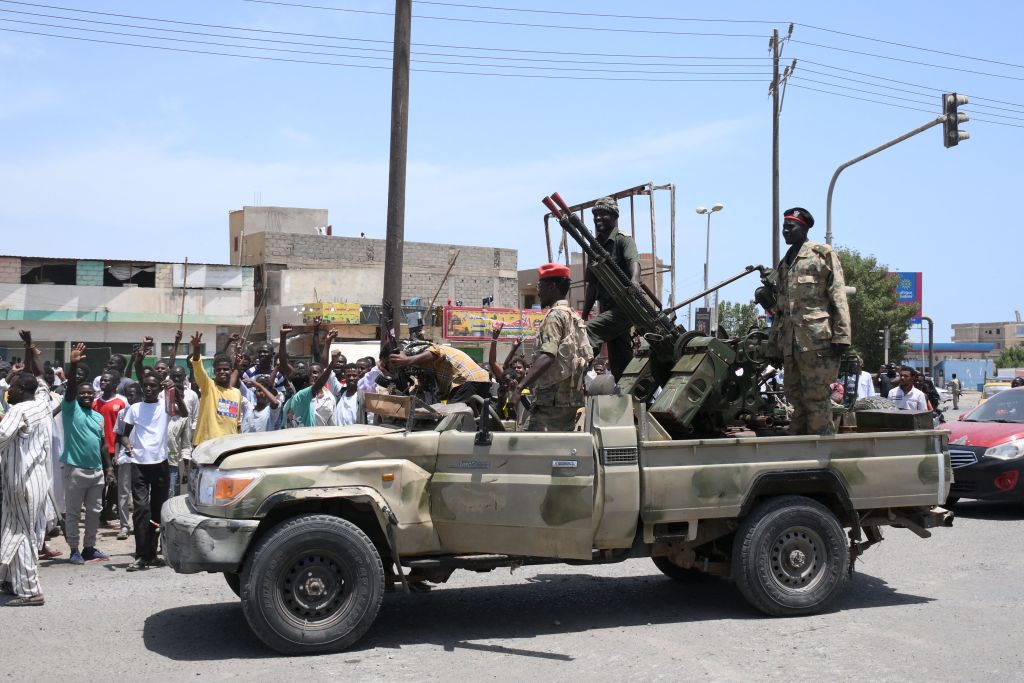Sudan’s rocky path to democracy took a detour this weekend when long-simmering tensions between the country’s top generals erupted into violence. Now onlooking countries are quietly jockeying for economic and political influence in a conflict that shows no signs of stopping.
The violence began Saturday in Sudan’s capital city of Khartoum and quickly spread nationwide, from Darfur in the west to Port Sudan in the east. By Wednesday, the clashes had left at least 270 people dead and thousands more injured. Civilians across the country of more than 45 million people are sheltering in place as international negotiators try to broker a temporary ceasefire to allow for evacuations. Hospitals, government buildings, and Khartoum International Airport have all come under fire.
The warring groups are led by Sudan’s two de facto leaders: Gen. Abdel Fattah al-Burhan, who commands the Sudanese Armed Forces (SAF), and Mohamed Hamdan “Hemedti” Dagalo, leader of the powerful Rapid Support Forces (RSF) paramilitary group. The two have teamed up in the past, first in the fight to overthrow deposed Sudanese President Omar al-Bashir’s Islamist, autocratic rule and later in their resistance to civilian leadership. But as domestic and international pressure to follow through with Sudan’s democratic transition mounted, the military leaders turned on one another.
“It was entirely expected and pretty predictable,” said Cameron Hudson, former chief of staff to the U.S. special envoy for Sudan and now a senior associate at the Center for Strategic and International Studies. “You can’t have two competing national armies in the same country.”
The RSF rose to power as the Janjaweed, an Arab militia infamous for handling the Bashir regime’s dirty work, most notably in its genocidal campaign in Darfur more than a decade ago. After hostilities there ended, Bashir integrated the militia into the country’s security services, branded it the RSF, and entrusted more and more power to Hemedti’s rising star. The ex-warlord has since turned his forces into a money-making venture, securing the country’s gold mining areas and renting out fighters to nearby countries, fighting on behalf of Saudi Arabia in Yemen and the United Arab Emirates (UAE) in Libya.
When a popular uprising broke out in 2019, Hemedti proved a powerful partner to Burhan in putting an end to Bashir’s reign. The two leaders agreed to participate in Sudan’s transition to civilian rule but later partnered again to carry out a military coup in 2021. Rifts began to surface amid recent pushes for Sudan’s army to absorb the RSF. While Hemedti accuses Burhan of trying to revive Bashir’s dictatorship, Burhan accuses the RSF leader of commanding a rogue militia of “country bumpkins.”
Now both factions have strong international backing. While Burhan enjoys the support of Egyptian President Abdel Fattah al-Sisi, the Gulf monarchies are likely to secretly side with their guns-for-hire, the RSF. Hemedti’s fighters have reportedly been launching anti-aircraft missiles in Khartoum and, while it’s unclear where they got them, analysts say the UAE is the likely supplier.
The RSF also appears to have the backing of a usual suspect: Russia. Vladimir Putin has extended his influence in Sudan via Russia’s Wagner Group, which first entered the country on behalf of Bashir but now maintains close ties with the RSF. The Russian mercenary fighters have worked together with Hemedti to secure and develop Sudan’s gold mines, at one point disguising gold smuggling flights as cookie shipments. In exchange for gold, Wagner reportedly trains and arms the RSF.
But Moscow’s interests aren’t solely commercial. Greater sway over Sudan would provide Russia access to the Red Sea to project its military might in the strategic waterway and the Indian Ocean. Russian Foreign Minister Sergey Lavrov visited the country in February to finalize an agreement to build a Russian naval headquarters in the city of Port Sudan, reportedly meeting with both Burhan and Hemedti while there. A Russian foothold in Sudan would also connect it to the Central African Republic and Libya, two neighboring countries under varying degrees of Russian control.
“We believe that the Wagner Group is also helping the RSF with their tactical decision-making and military planning,” Hudson said in an interview. “Russia sees an opportunity here, through its Wagner Group, to try to further implant itself in Africa.”
The United States, meanwhile, was among the loudest voices calling for the country’s democratic transition—in no small part because of its national security interest in having a stable Sudan. Analysts now fear that the warfare could spread to nearby countries, particularly Ethiopia, Somalia, and South Sudan, which have all dealt with their own destructive conflicts in recent years. There’s also concern that the fighting and displacement could breed extremism on the Horn of Africa, with Islamic State-affiliated Telegram channels already calling on Sudan’s Muslims to take advantage of the unfolding conflict to accumulate arms.
“Washington saw Sudan as a potential model for other countries in the region who were trying to emerge from autocracy and move toward a more democratic path,” Hudson said. “This would be a major setback to that message.”







Please note that we at The Dispatch hold ourselves, our work, and our commenters to a higher standard than other places on the internet. We welcome comments that foster genuine debate or discussion—including comments critical of us or our work—but responses that include ad hominem attacks on fellow Dispatch members or are intended to stoke fear and anger may be moderated.
With your membership, you only have the ability to comment on The Morning Dispatch articles. Consider upgrading to join the conversation everywhere.